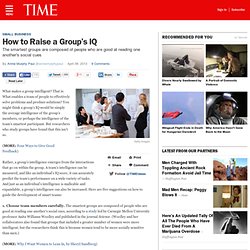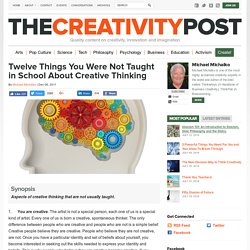

The Seven Elements of a Creative Personality. 10 Things Reality TV Taught Me About Leadership. 14 Bad Habits That Can Cost You Your Job. How To Raise a Group’s IQ. What makes a group intelligent?

That is: What enables a team of people to effectively solve problems and produce solutions? You might think a group’s IQ would be simply the average intelligence of the group’s members, or perhaps the intelligence of the team’s smartest participant. But researchers who study groups have found that this isn’t so.
(MORE: Four Ways to Give Good Feedback) Rather, a group’s intelligence emerges from the interactions that go on within the group. 1. (MORE: Why I Want Women to Lean In, by Sheryl Sandberg) 2. 3. (MORE: Highlighting Is a Waste of Time: The Best and Worst Learning Techniques) 4. (MORE: Can Mindfulness Really Help You Focus?) Top 10 Ways to Cure Your Boredom at Work. 10 Tricks Employers Use To Cheat Workers Out Of Overtime. Seven Things A Headhunter Won't Tell You.
Ten Things Your Boss Doesn't Want You To Know. Path.To : Fall in love with your next job. New Survey: Majority of Employees Dissatisfied. Right Management, a subsidiary of the giant staffing firm ManpowerGroup, just released a new snapshot survey that underlines the dissatisfaction among American workers.

At a time of high unemployment, lackluster job growth and major uncertainty in world financial markets, many employees feel stuck in their jobs, unable to consider a career move even if they’re unhappy. Right Management ran the online survey between April 16 and May 15, and culled responses from 411 workers in the U.S. and Canada. Only 19% said they were satisfied with their jobs. Another 16% said they were “somewhat satisfied.” But the rest, nearly two-thirds of respondents, said they were not happy at work. Staffing firms and consultants release employee engagement and loyalty surveys periodically. What’s the message to employers? Untitled. Three-minute timed test. 1.

Read everything before doing anything. 2. Put your name in the upper left-hand corner of this paper. 3. Circle the word "Name" in sentence two. 4. Twelve Things You Were Not Taught in School About Creative Thinking. 2382 516Share Synopsis Aspects of creative thinking that are not usually taught. 1.

You are creative. The artist is not a special person, each one of us is a special kind of artist. Silicon Valley needs to end its snobbery about computer science degrees. I don’t have a computer science degree.

There, I said it. At too many companies around Silicon Valley that would make me unemployable. I’ve been amused by the scandal surrounding Yahoo CEO Scott Thompson’s embellishment of his resume to include a computer science degree he didn’t earn. I’ve struggled with Silicon Valley’s obsession over computer science degrees. Lying about credentials is wrong, but Silicon Valley’s snobbery on the issue is short-sighted. For starters, it’s important to keep in mind that three of the best product and business minds in tech never got computer science degrees: Bill Gates, Mark Zuckerberg, and Steve Jobs.
I am certainly not any of those guys. I’ve gone toe-to-toe with top executives, investors, and technologists. I bring a lot of valuable skills and experience with me to a company, whether at a startup or a big company. While I’m disclosing things, I should also disclose that I don’t have an accounting degree. For many years, I left my major off my resume. 8 Rules For Creating A Passionate Work Culture. Several years ago I was in the Thomson Building in Toronto.

I went down the hall to the small kitchen to get myself a cup of coffee. Ken Thomson was there, making himself some instant soup. At the time, he was the ninth-richest man in the world, worth approximately $19.6 billion. Enough, certainly, to afford a nice lunch. I looked at the soup he was stirring. Thomson understood value. In 1976, Thomson inherited a $500-million business empire that was built on newspapers, publishing, travel agencies, and oil.
He left both a financial legacy and an art legacy, but his most lasting legacy might be the culture he created. For the long-term viability of any enterprise, Thomson understood that you needed a viable corporate culture. Thomson created a culture that extended out from him and has lived after him. 1. Hire for passion and commitment first, experience second, and credentials third.